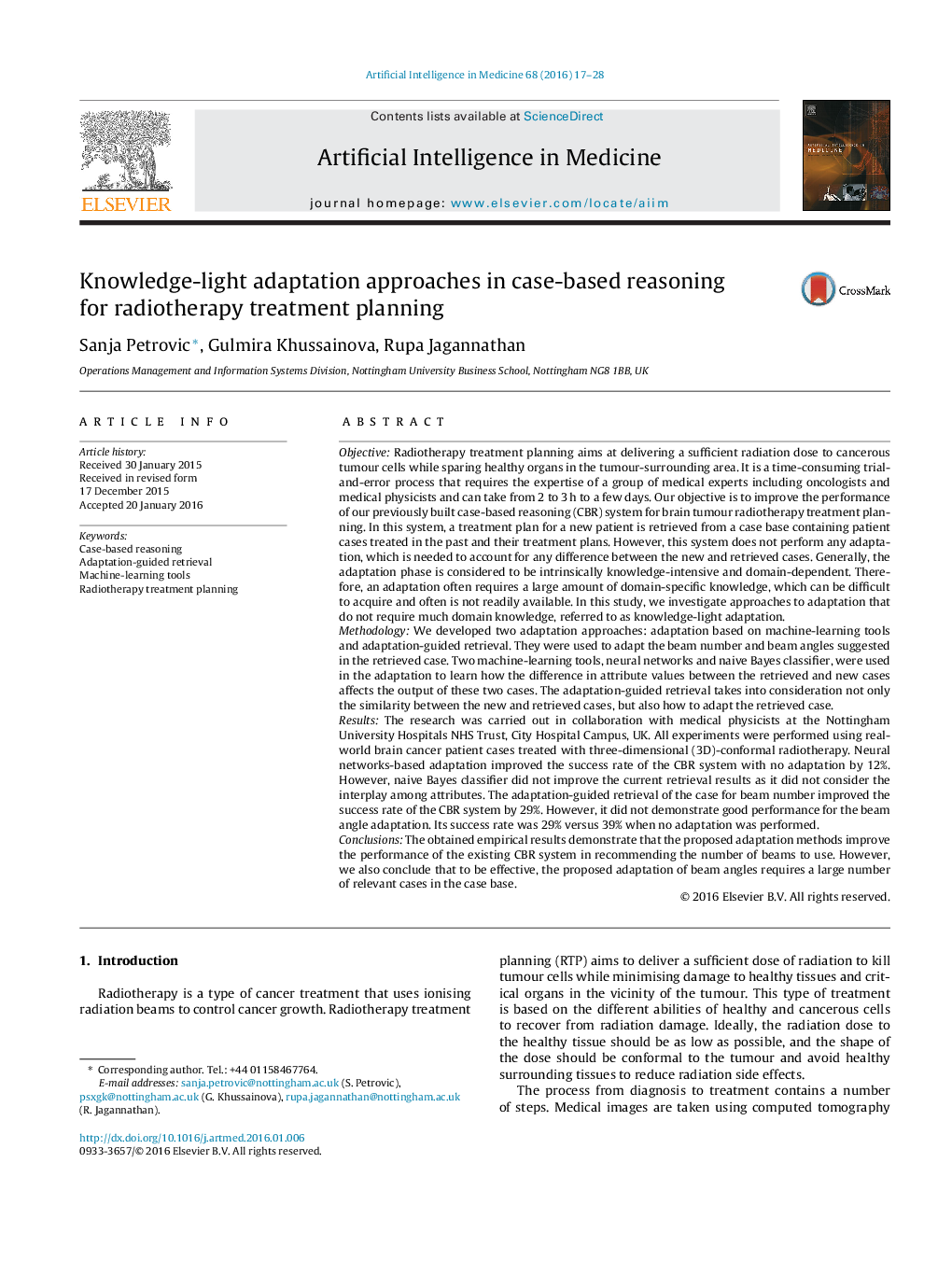| کد مقاله | کد نشریه | سال انتشار | مقاله انگلیسی | نسخه تمام متن |
|---|---|---|---|---|
| 377560 | 658792 | 2016 | 12 صفحه PDF | دانلود رایگان |
• This paper is concerned with a case-based reasoning (CBR) system for radiotherapy treatment planning for brain cancer patients, which has been developed in collaboration with medical physicists at the Nottingham University Hospitals NHS Trust, City Hospital Campus, UK.
• The developed CBR system generates the parameters of a treatment plan by capturing the subjective and intuitive knowledge of medical physicists.
• In this research we focus on the adaptation stage of the CBR system in which the solution (treatment plan) of the retrieved case is adapted to meet the needs of the new case (patient) by considering differences between the retrieved and new cases.
• We investigate approaches to adaptation that do not require much domain knowledge, referred to as knowledge-light adaptation.
• Results obtained by three developed adaptation approaches including adaptation based on Neural Networks and naïve Bayes classifier, and adaptation-guided retrieval are presented.
ObjectiveRadiotherapy treatment planning aims at delivering a sufficient radiation dose to cancerous tumour cells while sparing healthy organs in the tumour-surrounding area. It is a time-consuming trial-and-error process that requires the expertise of a group of medical experts including oncologists and medical physicists and can take from 2 to 3 h to a few days. Our objective is to improve the performance of our previously built case-based reasoning (CBR) system for brain tumour radiotherapy treatment planning. In this system, a treatment plan for a new patient is retrieved from a case base containing patient cases treated in the past and their treatment plans. However, this system does not perform any adaptation, which is needed to account for any difference between the new and retrieved cases. Generally, the adaptation phase is considered to be intrinsically knowledge-intensive and domain-dependent. Therefore, an adaptation often requires a large amount of domain-specific knowledge, which can be difficult to acquire and often is not readily available. In this study, we investigate approaches to adaptation that do not require much domain knowledge, referred to as knowledge-light adaptation.MethodologyWe developed two adaptation approaches: adaptation based on machine-learning tools and adaptation-guided retrieval. They were used to adapt the beam number and beam angles suggested in the retrieved case. Two machine-learning tools, neural networks and naive Bayes classifier, were used in the adaptation to learn how the difference in attribute values between the retrieved and new cases affects the output of these two cases. The adaptation-guided retrieval takes into consideration not only the similarity between the new and retrieved cases, but also how to adapt the retrieved case.ResultsThe research was carried out in collaboration with medical physicists at the Nottingham University Hospitals NHS Trust, City Hospital Campus, UK. All experiments were performed using real-world brain cancer patient cases treated with three-dimensional (3D)-conformal radiotherapy. Neural networks-based adaptation improved the success rate of the CBR system with no adaptation by 12%. However, naive Bayes classifier did not improve the current retrieval results as it did not consider the interplay among attributes. The adaptation-guided retrieval of the case for beam number improved the success rate of the CBR system by 29%. However, it did not demonstrate good performance for the beam angle adaptation. Its success rate was 29% versus 39% when no adaptation was performed.ConclusionsThe obtained empirical results demonstrate that the proposed adaptation methods improve the performance of the existing CBR system in recommending the number of beams to use. However, we also conclude that to be effective, the proposed adaptation of beam angles requires a large number of relevant cases in the case base.
Journal: Artificial Intelligence in Medicine - Volume 68, March 2016, Pages 17–28
